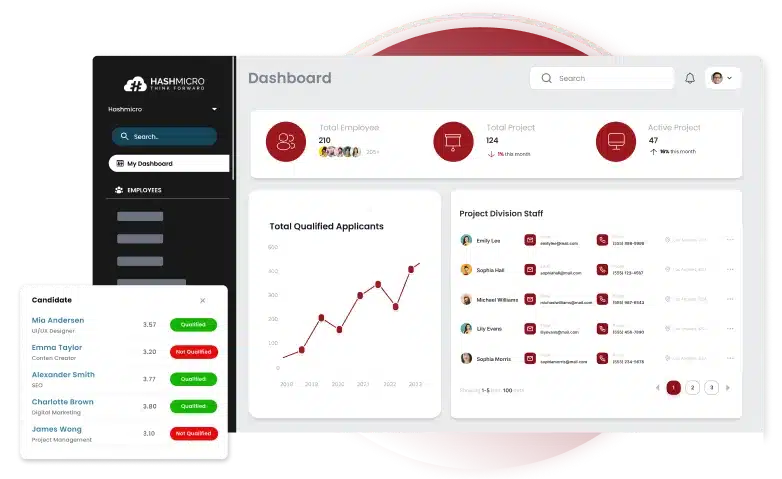You might not realize the power of workforce management until the numbers start to speak for themselves. Imagine the impact of reduced absenteeism, smoother operations, and happier, more productive employees. That’s the kind of transformation businesses crave—and it’s within reach.
What if you could make that happen? With the right workforce management system, you can cut absenteeism by 20%, boost efficiency, and create a more engaged workforce. It’s the smart way to elevate your operations and stay ahead in today’s competitive market.
In this article, we’ll dive into how workforce management works, why it’s essential, and how it can drive real results for your business.
Key Takeaways
|
What is a Workforce Management System?
A workforce management system refers to a comprehensive, integrated set of tools and processes that help businesses plan, manage, and track employee work, including time and attendance, scheduling, and compliance with labor laws.
More than just operational oversight, modern WFM solutions also adapt to changing employee expectations, lifestyles, and well-being, fostering workforce engagement through strategic workforce planning for growth.
Additionally, workforce management practices assist employers in effectively allocating resources and monitoring compliance with evolving workplace regulations. They also enable businesses to anticipate challenges, allowing for proactive measures that enhance productivity and minimize risks.
Key Components of Workforce Management System

A reliable workforce management system addresses numerous essential aspects for effective operations. These components improve process efficiency, productivity, and regulatory compliance. The best HR software consists of the following main features:
1. Time and attendance management
GPS tracking and facial recognition ensure workers are where they should be, lowering the possibility of fraudulent check-ins. This method makes attendance management easy for everyone by increasing accuracy and streamlining the procedure.
2. Employee scheduling and management
Managing shifts is made simple by flexible scheduling solutions. Establishing schedules that benefit the company and its workers, whether set or shift-based, saves time and maintains efficiency.
3. Payroll and compensation management
Automating wage computations for hourly and daily employees requires less manual labor. The payroll process is more accurate and efficient when paystubs are produced straight from timesheet data.
4. Task management and approvals
Approval approvals proceed more quickly when you can assign jobs and rely on automated follow-up notifications. This eliminates the need for continual manual oversight and keeps projects on schedule.
5. Talent and performance management
Using HR KPIs to track performance provides useful information about employees’ progress. The preferred evaluation methods improve talent management by identifying high performers and those needing improvement.
6. Evaluation of competency gaps and matching
When gaps are identified, matching employee skills with job needs is simpler. By ensuring that workers are in the proper roles and ready to advance, this feature enhances performance on both an individual and team level.
Benefits of Workforce Management
Research shows that effective workforce management delivers measurable improvements across various business metrics. Studies have highlighted significant gains in employee engagement, productivity, and overall performance.
Let’s explore these key benefits, backed by data from these data sources, that illustrate the impact of workforce management software.
- Increase in employee engagement: increases by 18% when organizations deploy effective performance management systems. Employees feel more connected and motivated in their jobs when they have defined performance goals and receive regular feedback.
- Improved productivity: Proper adoption of performance management systems results in a 15% improvement in productivity. Employees can focus on reaching key milestones by setting clear expectations and conducting regular appraisals.
- Stronger leadership involvement: Businesses have a 20% higher success rate when leaders actively participate in performance management. Leadership engagement ensures that performance indicators are in line with corporate objectives.
- Better overall performance: Companies that apply systematic performance measurement report a 12% increase in overall performance. Tracking performance versus objectives enables firms to discover and fix concerns early on
- Higher employee satisfaction: Employee satisfaction is 25% greater in organizations that have well-defined performance metrics. Clear measurements promote openness and fairness, providing people with a sense of success and purpose in their jobs.
- Reduced turnover: Effective performance measurement systems can reduce turnover by 10%. When employees understand how their performance is measured and how it relates to company goals, they are more likely to stay.
Disadvantages of Using Manual Workforce Management

Every company has different problems; your workforce management system should be built to solve them. Among the most prevalent workforce management difficulties are:
1. Time monitoring
Almost all employees in a company are impacted by time tracking. Slow, inaccurate, or disconnected time and labor systems from their master HR system are a problem for a lot of companies.
These problems may result in costly errors, needless administrative work, and payroll difficulties. Even worse, erroneous paychecks can damage workers’ morale and put businesses at risk for legal issues and damage to their reputations.
2. Represented employees
Because of their higher salary, benefits, and complicated contract provisions pertaining to seniority, tenure, eligibility, and pay entitlements, managing represented employees can be challenging.
Organizations frequently struggle to comply with these standards without a strong WFM system to effectively handle these issues.
3. Absence management
Businesses may experience higher expenses, risks, and decreased production in the absence of a dependable attendance management system.
Organizations find it challenging to maintain compliance and efficiently handle absences when managing absence policies across many nations and regions with disparate regulations.
4. Reporting health and safety issues
It might be difficult for many businesses to get alerts about these incidents in a timely manner. Uncertain procedures or complex reporting tools may make employees hesitant to report near-misses or dangerous situations. Having tools that are easy to use
Things to Consider Before Choosing a Workforce Management System
Organizations should adhere to these best practices in order to successfully implement workforce management solutions:
- Employee training and support: Ensure that employees are properly trained on how to use the workforce management system. Providing clear instructions and ongoing support will help employees feel comfortable with the new tools and minimize resistance to change.
- Customization and scalability: Choose a workforce management solution that can be tailored to your organization’s unique needs and is flexible enough to scale as your business grows. The system should be adaptable to evolving workflows, employee numbers, and regulatory requirements.
- Data security and privacy: Given the sensitive nature of employee data, it’s crucial to implement strong data security measures. Ensure the workforce management system complies with privacy laws and is equipped with encryption, access controls, and regular audits to protect data.
- Analytics and reporting: A workforce management solution should offer robust analytics and reporting features. This allows organizations to gain insights from employee data, track trends, forecast future staffing needs, and make data-driven decisions to improve workforce efficiency.
- Change management: Implementing new systems can be challenging for any organization. Develop a clear change management strategy that includes communication, training, and addressing employee concerns to ensure a smooth transition to the new workforce management solution.
You can also check out our other article on the best talent management software to help you make a more informed decision for your business.
Maximize Workforce Efficiency with HashMicro HR System

Workforce management doesn’t have to be difficult. With HashMicro’s HR system, you can automate time-consuming processes and concentrate on what matters most: your business and your employees.
HashMicro offers a comprehensive suite of capabilities to make HR management simpler and more effective, from tracking attendance with GPS and facial recognition to designing flexible timetables that work for everyone.
This vendor also offers a no-cost demo of the software, which allows companies to see its full capabilities without any form of commitment.
To see how HashMicro can help you improve the efficiency of your workforce management procedure, review the main features listed below.
- Facial Recognition and GPS Attendance with Preventive Fraud Attendants: It minimizes fraud and guarantees accurate employee attendance tracking, both of which are essential for overseeing a sizable or dispersed staff.
- Roster and Dynamic Employee Working Schedule Management: Flexible scheduling is crucial for managing shift-based or fluctuating work hours, maximizing workforce numbers, and sustaining productivity.
- Hourly and Daily Workers Payslip Management: Automating payroll for hourly and daily employees reduces errors and administrative burdens while ensuring timely and accurate compensation.
- Talent Management with KPI Tracking: It allows the monitoring of employee performance and ensures alignment with corporate objectives, boosting both individual and team development.
- Comprehensive Performance Evaluation with Nine Box Matrix: Methodically evaluating employees’ performance and potential helps formulate strategic plans for hiring, training, and talent management.
- Employee Development & Training Plan with e-Learning Management: Companies may guarantee that their personnel is up to date and developing in the appropriate areas by coordinating training with performance evaluations.
- Objective Key This feature ensures that all members of the company are focused on measurable goals by promoting accountability and openness.
Conclusion
Workforce management is a critical component of any successful business. Companies that use an effective workforce management system will benefit from efficient resource allocation, increased compliance, and greater employee engagement.
HashMicro HR software provides a comprehensive solution for Singaporean companies looking for ways to simplify and automate human resources processes.
GPS and facial recognition attendance tracking, flexible scheduling, and automated payroll will improve the efficiency of your HR operations. HashMicro goes beyond simply managing the essentials; it allows businesses to focus on growth by improving performance tracking and employee development.
Are you curious about other benefits HashMicro HR Software can offer? Try the free demo now!
Warning: Undefined array key "med" in /home/hashmicr/public_html/blog/wp-content/plugins/insert-headers-and-footers/includes/class-wpcode-snippet-execute.php(419) : eval()'d code on line 281













